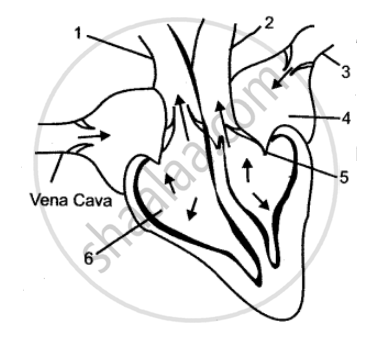Advertisements
Advertisements
Question
What are the components of the transport system in human beings? What are the functions of these components?
Solution 1
The main components of the transport system in human beings are the heart, blood, and blood vessels.
- The heart pumps oxygenated blood throughout the body. It receives deoxygenated blood from the various body parts and sends this impure blood to the lungs for oxygenation.
- Blood helps in the transport of oxygen, nutrients, CO2, and nitrogenous wastes.
- The blood vessels (arteries, veins, and capillaries) carry blood either away from the heart to various organs or from various organs back to the heart.
Solution 2
The components of the human the transport system is blood-vascular system and lymphatic system.
- Blood vascular system: It consists of the heart, blood vessels and blood.
- Heart: It is a muscular pumping organ which keeps the circulating medium (blood) in a state of continuous movement.
- Blood vessels: These are channels through which blood flows. Blood vessels are of three types.
- Arteries: They carry oxygenated blood from the heart to different parts of the body.
- Veins: They transport deoxygenated blood from different parts of the body back to the heart.
- Capillaries: They help in the exchange of material between blood and living cells through tissue fluid.
- Blood: It consists of plasma and corpuscles (RBCs, WBCs and platelets)
- Plasma: It is the liquid part of the blood which helps in the transport of hormones, nutrients, excretory matter, etc.
- RBCs: They help transport respiratory gases - O2 and CO2.
- WBCs: They act as soldiers of the body and provide immunity.
- Platelets: Help in blood clotting.
- Lymphatic system: This is a network of thin-walled vessels that consists of lymph, lymphatic vessels, and lymph nodes.
- Lymph: Helps in the transport of respiratory gases, fatty acids, glycerol, vitamins, etc. inside body.
- Lymphatic vessels: Collect lymph and transport it to the veins.
- Lymph node: Helps in the formation of lymphocytes.
APPEARS IN
RELATED QUESTIONS
What is hypertension? Why is it caused? What harm can it do?
Define the term Circulatory system.
Explain the following:
Why is the SA node called the pace-maker of the heart?
Name the following:
The first heart sound.
Choose the correct answer:
Which of the following engulfs pathogen rapidly?
The diagram given below represents the human heart in one phase of its activity. Study the same and then answer the question that follow:
Which part of the heart is contracting in this phase? Give a reason to support your answer.

Answer in only one sentence of the following question:
Mention the role of the pacemaker in human heart.
When are the sounds ‘LUBB’ and ‘DUB’ produced during heartbeat ?
Why is the SA node called the pacemaker of the heart?
Describe pericardium.
Which of the following has thickest wall?
Blood is pumped by
What does the QRS - complex represent?
____________ guards the left atrioventricular aperture in human heart.
Blood capillaries show the presence of ______
The correct match of blood vessel, its connection and O2 content is ____________.
What is the advantage of having a four-chambered heart?
Why is the sino-atrial node referred to as the pacemaker of the human heart?
Give the meaning of pacemaker.
Give the exact location of the pericardium.
